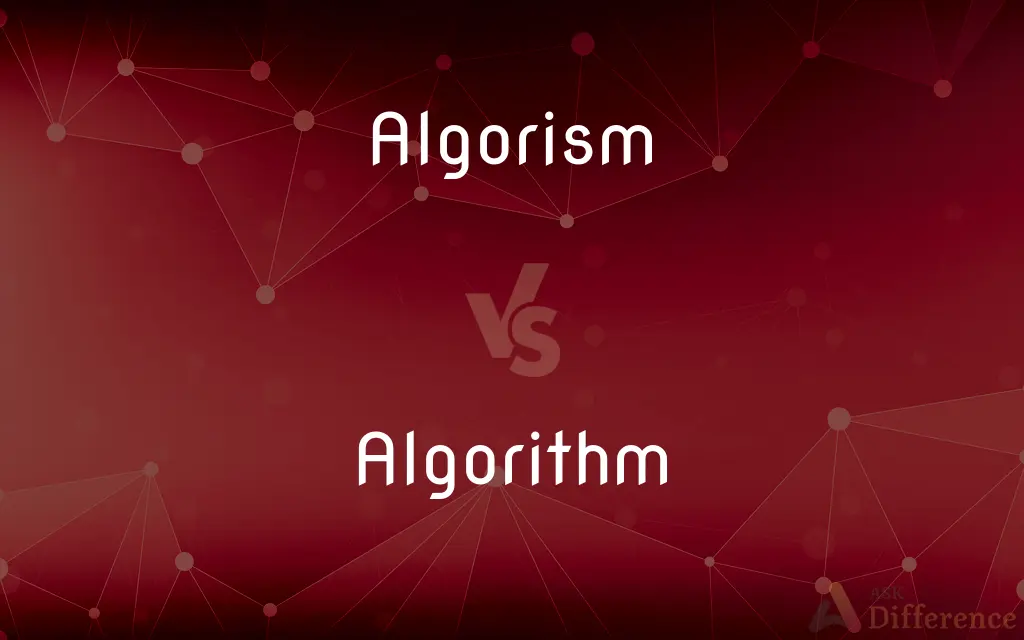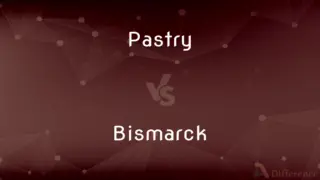Algorism vs. Algorithm — What's the Difference?
By Tayyaba Rehman & Fiza Rafique — Updated on April 21, 2024
Algorism refers to the art of arithmetic using Arabic numerals, while an algorithm is a step-by-step procedure for calculations.

Difference Between Algorism and Algorithm
Table of Contents
ADVERTISEMENT
Key Differences
Algorism primarily denotes the historical method of performing arithmetic calculations using Arabic numerals, introduced in Europe in the Middle Ages. On the other hand, an algorithm is a broader concept, applicable in various fields like computer science, mathematics, and more, detailing a series of steps to solve a problem or perform a computation.
The term algorism comes from the Latin word 'algorismus', itself derived from the name of a Persian mathematician, Al-Khwarizmi. Whereas, the term algorithm also stems from the same source, but its meaning has evolved to encompass any set of rules to be followed in calculations or other problem-solving operations.
Algorism is specifically linked to the use of the decimal system and often involves basic operations such as addition, subtraction, multiplication, and division. On the other hand, algorithms can be complex and include logical sequences, loops, and decision-making steps in programming and beyond.
In education, algorism might refer to the simple methods taught in elementary arithmetic classes. Conversely, learning about algorithms often occurs in higher education contexts, especially in courses related to computer science, where they form the backbone of software development and data processing.
The spread of algorism was crucial for the development of commerce and accounting in medieval Europe. Meanwhile, algorithms have shaped modern technology, from the algorithms that run search engines to those that control self-driving cars.
ADVERTISEMENT
Comparison Chart
Definition
Art of calculation using Arabic numerals
Step-by-step procedure for solving problems
Origin
Middle Ages, from Latin "algorismus"
Evolved from "algorismus" to broader applications
Application
Basic arithmetic operations
Various fields including computing, math
Complexity
Generally simple
Can be very complex
Educational Context
Elementary arithmetic teaching
Advanced education, especially in computing
Compare with Definitions
Algorism
Historical arithmetic technique prior to the advent of calculators.
Medieval scholars used algorism for commerce.
Algorithm
A formula or procedure for solving a mathematical problem.
He devised an algorithm to factor large prime numbers.
Algorism
Basic calculation methods taught in schools.
She excels in algorism, quickly adding and subtracting numbers.
Algorithm
A methodical, logical rule or procedure that guarantees solving a particular problem.
The bakery's scheduling algorithm maximizes oven usage.
Algorism
The use of the decimal system in calculations.
Algorism made it easier to compute larger numbers efficiently.
Algorithm
A process or set of rules followed in calculations.
The algorithm for data encryption ensures secure communication.
Algorism
The method of arithmetic using Arabic numerals.
Learning algorism involves understanding how to perform long division.
Algorithm
A set of instructions designed to perform a specific task.
The computer program uses an algorithm to sort names alphabetically.
Algorism
The foundational arithmetic skills developed using Arabic numerals.
His algorism skills were evident in his quick mental calculations.
Algorithm
The basis of programming in computer science.
Learning algorithms is crucial for developing efficient software.
Algorism
Algorism is the technique of performing basic arithmetic by writing numbers in place value form and applying a set of memorized rules and facts to the digits. One who practices algorism is known as an algorist.
Algorithm
In mathematics and computer science, an algorithm ( (listen)) is a finite sequence of well-defined, computer-implementable instructions, typically to solve a class of specific problems or to perform a computation. Algorithms are always unambiguous and are used as specifications for performing calculations, data processing, automated reasoning, and other tasks.
Algorism
The Arabic system of numeration; the decimal system.
Algorithm
A finite set of unambiguous instructions that, given some set of initial conditions, can be performed in a prescribed sequence to achieve a certain goal and that has a recognizable set of end conditions.
Algorism
Computation with Arabic figures.
Algorithm
(countable) A collection of ordered steps that solve a mathematical problem. A precise step-by-step plan for a computational procedure that possibly begins with an input value and yields an output value in a finite number of steps.
Algorism
Obsolete spelling of algorithm}} {{qual
Algorithm
Calculation with Arabic numerals; algorism.
Algorism
The art of calculating by nine figures and zero; computation with Arabic figures.
Algorithm
A precise rule (or set of rules) specifying how to solve some problem; a set of procedures guaranteed to find the solution to a problem.
Algorism
The Arabic system of numeration.
Algorithm
A precise rule (or set of rules) specifying how to solve some problem
Algorism
The art of calculating with any species of notation; as, the algorithms of fractions, proportions, surds, etc.
Algorism
The Arabic (or decimal) system of numeration
Algorism
Computation with Arabic figures
Common Curiosities
How does an algorithm function in computer programming?
In programming, an algorithm is a sequence of coded instructions that the computer follows to achieve a desired outcome.
What is the historical significance of algorism?
Algorism was crucial for the development of modern arithmetic and commerce in medieval Europe.
What are some common examples of algorithms in daily life?
Examples include the algorithm used by a GPS for finding the fastest route and the algorithms behind search engine rankings.
How did algorism reach Europe?
Through translations of Arabic texts into Latin during the Middle Ages.
Are algorism and algorithm interchangeable terms?
No, algorism specifically refers to arithmetic with Arabic numerals, whereas algorithm is a general procedure for problem-solving.
Can algorithms be applied outside of mathematics and computing?
Yes, algorithms can be designed for a wide range of processes, including biological systems and everyday decision-making.
How do algorithms impact modern technology?
They are fundamental to the operation of software, impacting everything from internet searches to artificial intelligence.
How are algorithms tested for efficiency?
Through techniques like benchmarking and profiling to measure performance and optimize speed or resource usage.
What skills are necessary to understand algorithms?
Skills in logic, mathematics, and often programming are necessary to grasp complex algorithms.
How has the role of algorithms evolved with the advent of computers?
They have become more complex and integral to virtually all digital operations and systems.
Is algorism still taught today?
Yes, as a basic concept in elementary mathematics education.
Why is understanding algorithms important for software development?
Algorithms form the basis of all computer programming, essential for creating efficient and effective software solutions.
Can learning about algorism help with understanding modern algorithms?
Basic principles of arithmetic in algorism can provide a foundation for understanding more complex algorithms.
What advancements in algorithms are most significant in recent times?
Developments in machine learning and artificial intelligence algorithms that enable systems to learn and adapt from data.
What distinguishes an algorithm from a simple calculation?
Algorithms involve a sequence of operations and can handle more complex problem-solving than simple direct calculations.
Share Your Discovery

Previous Comparison
Nylon vs. Polyamide
Next Comparison
Pastry vs. BismarckAuthor Spotlight
Written by
Tayyaba RehmanTayyaba Rehman is a distinguished writer, currently serving as a primary contributor to askdifference.com. As a researcher in semantics and etymology, Tayyaba's passion for the complexity of languages and their distinctions has found a perfect home on the platform. Tayyaba delves into the intricacies of language, distinguishing between commonly confused words and phrases, thereby providing clarity for readers worldwide.
Co-written by
Fiza RafiqueFiza Rafique is a skilled content writer at AskDifference.com, where she meticulously refines and enhances written pieces. Drawing from her vast editorial expertise, Fiza ensures clarity, accuracy, and precision in every article. Passionate about language, she continually seeks to elevate the quality of content for readers worldwide.














































